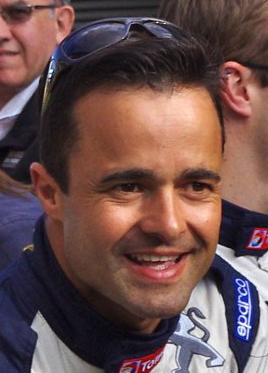
José Pedro Mourão Lamy Viçoso, OIH, known as Pedro Lamy, is a Portuguese professional racing driver currently racing in endurance races teaming up with Mathias Lauda and gentleman driver Paul Dalla Lana. He was the first Portuguese driver to score a point in a Formula One World Championship event, in the 1995 Australian Grand Prix, for Minardi.

ORECA is a French racing team and race car constructor, founded in 1973 and run by Hugues de Chaunac, former team manager of F1 team AGS. Oreca has had success in many areas of motorsport. Since the early 1990s the team has concentrated on running sports cars and GT cars.

The Peugeot 908 HDi FAP is a sports prototype racing car built by the French automobile manufacturer Peugeot to compete in the 24 Hours of Le Mans endurance race, starting in 2007 and eventually winning in 2009. This effort, in development since 2005, was publicly unveiled on 15 June 2006. It first competed against the Audi R10 TDI, becoming the second diesel engined sports car from a major manufacturer, and then against the Audi R15 TDI. This was Peugeot Sport's first Le Mans effort since the end of the Peugeot 905 project in 1993. It won 19 from the 28 races in which it raced between 2007 and 2011.
Joest Racing is a sports car racing team that was established in 1978 by former Porsche works racer Reinhold Joest. Their headquarters are in Wald-Michelbach, Germany.
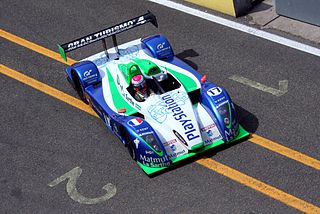
Pescarolo Sport was a motorsport team based in Le Mans, France, and founded in February 2000 by French racing driver Henri Pescarolo and his friend and partner, French publisher François Granet. They raced in the Le Mans Series and the 24 Hours of Le Mans. In October 2007, Henri Pescarolo purchased Jacques Nicolet's Saulnier Racing and created Pescarolo Automobiles, with the racing team becoming a division of the new company. The Pescarolo Automobiles went into receivership on 15 June 2010. Following a liquidation sale, the company was resold back to Henri Pescarolo and rebranded as Pescarolo Team for the 2011 season. However, the team's financial situation did not improve, and was wound up in January 2013.

The 2008 24 Hours of Le Mans was the 76th Grand Prix of Endurance, taking place on 14–15 June 2008 at the Circuit de la Sarthe, Le Mans, France, organised by the Automobile Club de l'Ouest (ACO). The test day was on June 1. The race was attended by 258,000 spectators. The Audi team's progress and victory was documented in the 2008 film Truth in 24.

The 2009 24 Hours of Le Mans was the 77th Grand Prix of Endurance, an endurance auto race run over 24 hours. It took place at the Circuit de la Sarthe, Le Mans, France, and was organised by the Automobile Club de l'Ouest (ACO) over 13–14 June 2009 and was started by Fiat and Ferrari chairman Luca Cordero di Montezemolo at 15:00 local time. A test day was initially scheduled for 31 May that year, but was canceled by the ACO due to economic concerns. The race was attended by 234,800 spectators.
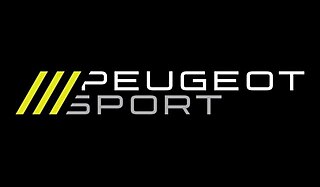
Peugeot Sport is the department of French carmaker Peugeot responsible for motorsport activities.
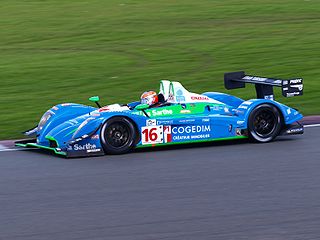
The Pescarolo 01 was the first sports prototype racing car built entirely by French team Pescarolo Sport. It had been designed to meet the LMP1 and LMP2 regulations for Le Mans Prototypes in the Le Mans Series as well as at the 24 Hours of Le Mans, and replace Pescarolo's previous C60 chassis which had been heavily modified from cars purchased through Courage Compétition. The 01s debut was at the 2007 1000 km of Monza.

The Audi R15 TDI, commonly abbreviated to the R15, is a Le Mans Prototype (LMP) racing car constructed by the German car manufacturer Audi AG. It is the successor to the Audi R10 TDI.

The 2009 Mobil 1 12 Hours of Sebring was the 57th running of the 12 Hours of Sebring and the opening round of the 2009 American Le Mans Series season. It took place at the Sebring International Raceway, Florida on March 21, 2009. Three new cars made their debut at Sebring: Audi's diesel R15 TDI, Acura's first LMP1 entry the ARX-02a, and the return of the BMW M3 to the GT2 category. It was also the last time GT1 category raced at the event.

The 78th 24 Hours of Le Mans was a non-championship 24-hour automobile endurance race for teams of three drivers each fielding Le Mans Prototype (LMP) and Grand Touring (GT) cars held from 12 to 13 June 2010 at the Circuit de la Sarthe, near Le Mans, France, before 238,150 spectators. It was the 78th 24 Hours of Le Mans as organised by the Automobile Club de l'Ouest (ACO).

The Oreca 01 is a Le Mans Prototype built by Oreca Racing in 2009. It replaced the Courage-Oreca LC70 raced previously by Oreca. It is powered by an engine from Japanese engine company AIM Power. It is a tuned Judd engine that develops 650 bhp/485 kW at 8000 rpm.

The 79th 24 Hours of Le Mans was a 24-hour automobile endurance race for 56 teams of three drivers in Le Mans Prototype (LMP) and Le Mans Grand Touring Endurance (LMGTE) cars, held before 249,500 spectators on 11 and 12 June 2011 at the Circuit de la Sarthe, near Le Mans, France. It was the third round of the 2011 Intercontinental Le Mans Cup and the race's 79th edition as organised by the automotive group the Automobile Club de l'Ouest (ACO) since 1923. On 24 April, six weeks prior, a test day was held.
Diesel automobile racing can refer to any use of diesel as a fuel for racing cars. The diesel-fueled vehicle may be used in direct competition with other vehicles, in a separate Diesel class in the same racing event, or in a diesel-only event.

The 2010 8 Hours of Le Castellet was the inaugural round of the 2010 Le Mans Series season. It took place at the Circuit Paul Ricard, Le Castellet, France on 11 April 2010. It was the first Le Mans Series race that is longer than the standard 1,000-km distance the LMS use since the 2007 Mil Milhas Brasil. Audi Sport Team Joest won the race overall in their first use of the Audi R15 TDI in the Le Mans Series, with drivers Allan McNish and Rinaldo Capello. Aston Martin Racing and Rebellion Racing completed the overall podium five laps behind the winning Audi. Strakka Racing also brought Honda Performance Development a win on their debut in the LMP2 category, leading the OAK Racing Pescarolo by 33 seconds. Applewood Seven won the Formula Le Mans category, the first event in which this class participated in the Le Mans Series. Team Felbermayr-Proton dominated the GT2 category by finishing in the top two positions, ahead of the first of the AF Corse Ferraris.

The Audi R18 is a Le Mans Prototype (LMP) racing car constructed by the German car manufacturer Audi AG. It is the successor to the Audi R15 TDI. Like its predecessor, the R18 uses a TDI turbocharged diesel engine but with a reduced capacity of 3.7 litres and in a V6 configuration. For the first time since the 1999 R8C, the Audi Le Mans prototype used a closed cockpit design. The R18 is also the first racing car from Audi to feature hybrid power.
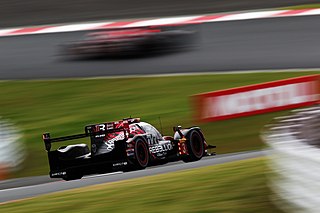
Rebellion Racing was a Swiss racing team that competed in endurance racing. The team competed in the 2011 Intercontinental Le Mans Cup season and won the LMP1 teams' title in the 2011 Le Mans Series season. The team started as an association between Speedy Racing and Sebah Racing, which began in 2008. Rebellion Racing's last team principal was Alexandre Pesci and the team manager was Bart Hayden.

The 60th Annual Mobil 1 Twelve Hours of Sebring was an 12-hour automobile endurance race for teams of three drivers each fielding sports prototype and grand touring cars held on March 17, 2012 at the Sebring International Raceway in Sebring, Florida before more than 90,000 spectators. It was the 60th 12 Hours of Sebring and the first round of both the 2012 FIA World Endurance Championship (WEC) and the 2012 American Le Mans Series (ALMS). Le Mans Prototype 1 (LMP1), Le Mans Prototype 2 (LMP2), Le Mans Prototype Challenge (LMPC), Le Mans Grand Touring Endurance (LMGTE), and Grand Touring Challenge (GTC) cars competed in the race.

The Audi R10 TDI is a sports prototype designed and built by Audi in partnership with Dallara. Built to the Le Mans Prototype 1 (LMP1) regulations, the R10 was highly successful throughout its career; the R10 became the first diesel-powered car to win the 24 Hours of Le Mans in 2006, in what would be the first of three 24 Hours of Le Mans wins. Unveiled to the public on 13 December 2005 in Paris, the R10 would go on to win the 2006 24 Hours of Le Mans just 200 days later.

















